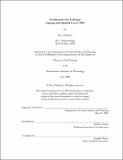Architecture for Cyborgs : laptops and spatial use at MIT
Author(s)
Goldman, Ezra (Ezra Joshua)
DownloadFull printable version (2.604Mb)
Alternative title
Laptops and spatial use at MIT
Other Contributors
Massachusetts Institute of Technology. Dept. of Urban Studies and Planning.
Advisor
William Porter.
Terms of use
Metadata
Show full item recordAbstract
Individuals have a particular set of tasks they need to accomplish or what might be called a "life pattern." These tasks must be accomplished within a particular set of places or "life spaces." What is the role of the laptop in defining these life spaces and patterns and how does it either enable or constrain an individual from acting out their life pattern within a particular life space? This study uses a variety of quantitative and qualitative analytical methods for understanding the adaptation of student behavior to new technologies on MIT campus with a focus on the Sloan School of Management. Laptops will only enable spatial flexibility if the nature of one's work ("life pattern") affords it (Norman, 1999), "mobility" or "flexibility" is perceived to be advantageous, and there are suitable behavior settings (Barker, 1989; Schoggen, 1989) within their "life space." Most students are not creating "a new office" (Duffy, 1997) or choosing "special places" (Mitchell, 2003) to work. They mostly choose to use a very limited range of locations, often similar to office-type spaces. Only an exceptional minority of most techno-enabled are becoming free roaming "neonomads" (Abbas, 2005). (cont.) Rather than being more "mobile," most people are now more "connected" wherever they go (Castells, 2006). Instead, they might rather be labeled technologically enhanced cyborgs (Mitchell, 2003, Picon, 2000). Our relationship to the physical surrounding environment changes depending on the degree to which we require our technological enhancements and how much our cyborg selves are supported by that environment.
Description
Thesis (M.C.P.)--Massachusetts Institute of Technology, Dept. of Urban Studies and Planning, 2007. This electronic version was submitted by the student author. The certified thesis is available in the Institute Archives and Special Collections. Includes bibliographical references (p. 47-50).
Date issued
2007Department
Massachusetts Institute of Technology. Department of Urban Studies and PlanningPublisher
Massachusetts Institute of Technology
Keywords
Urban Studies and Planning.